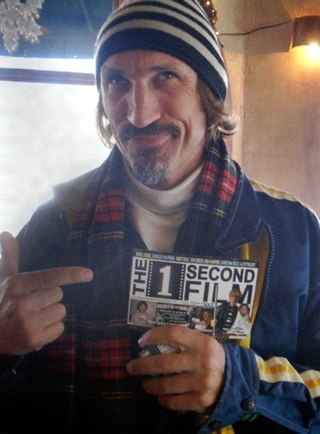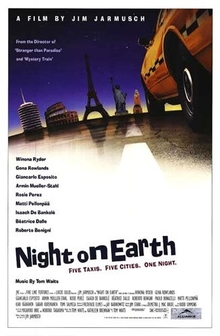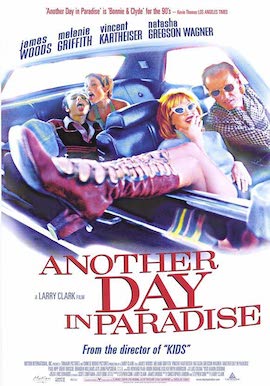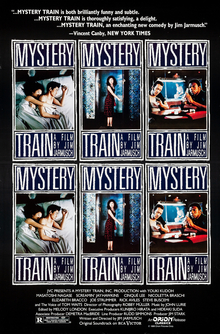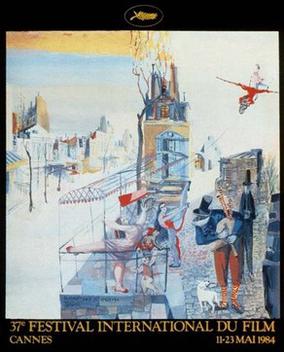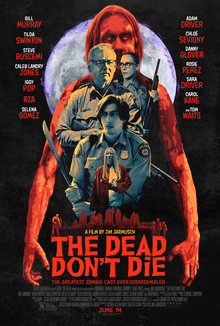Plot
The film is a three-act story about Willie, who lives in Brooklyn, and his interactions with the two other main characters, his cousin Eva and friend Eddie.
In the first act, Willie, a surly small-time gambler and hustler of Hungarian origin, receives a phone call from his Aunt Lotte in Cleveland informing him that his expected visit by his cousin Eva, who is coming from Hungary to live with Lotte, will have to be extended to ten days because Lotte is unexpectedly in the hospital. Willie makes it clear that he does not want Eva there. When Eva arrives, he orders her to speak English rather than Hungarian, as Willie strongly identifies as "American." He grudgingly begins to enjoy her company. He becomes protective, discouraging her from going out alone, or beyond certain streets. At one point, Eva takes the initiative to clean the apartment, which is fairly dirty. When she finds his vacuum cleaner, Willie playfully tries to persuade her that an American expression for vacuuming is "choking the alligator", but Eva doesn't believe him.
Despite his growing fondness for Eva, Willie refuses to take her on his trips to the racetrack with Eddie, his good-natured friend and hustling accomplice. Eddie fruitlessly tries to persuade him to bring Eva along. Willie and Eva watch football in the afternoon and late-night sci-fi movies. His esteem for her increases when she returns from an excursion with a few canned food items, a TV dinner "especially" for him, and, to his astonishment, a carton of cigarettes, all obtained without money. He smiles and shakes her hand, telling her "I think you're alright, kid."
Eva, smart, pretty, and low-key, likes to play her favorite song, Screamin' Jay Hawkins's "I Put a Spell on You", which Willie dislikes. He buys her a dress, which she dislikes. At this point it becomes evident that Willie has grown attached to Eva. When the ten days have passed, Eva leaves, and Willie is clearly upset to see her go. Eddie, on his way to visit Willie, sees her discard the dress on the street, but doesn't tell Willie.
The second act starts a year later and opens with Willie and Eddie winning a large amount of money by cheating at poker. Willie asks Eddie about borrowing his brother-in-law's car, telling him "I just wanna get out'a here, see sump'in different, ya know?". He actually wants to go to Cleveland to see Eva.
It is the middle of winter. When they arrive in Cleveland, they stop at Lotte's house, then go to surprise Eva at her job at a local fast-food restaurant, where she is excited and pleased to see them. However, they are soon just as bored as they were in New York. They pass the time by playing cards with Lotte and tagging along with Eva and her would-be boyfriend to the movies. They go to the pier on the frozen snow-covered lakefront to take in the view. Pressed by Eddie, Willie eventually decides to return to New York. When they say their goodbyes, Eva jokingly suggests that if they win big at the racetrack, they should "kidnap" her. Willie responds that they would take her someplace warm, because "this place is awful."
The final act begins with Willie suggesting to Eddie, on the road back to New York, that they should go to Florida instead. He then suggests they turn around and pick up Eva—which they do, to Lotte's obvious consternation. The three arrive in Florida and get a motel room. The next morning, the men leave Eva asleep in the room. Eva, awakening alone and with no food or cash, wanders outside in the windy bleak overcast afternoon to the beach, which appears not much more appealing than the windy bleak snowy Lake Erie scene in Cleveland from which they fled. When Willie and Eddie return, Eva's annoyance turns to dismay when the distraught pair reveal they have lost most of their money on dog races. They go for a walk on the beach to figure out what to do. Willie is clearly annoyed with Eddie, as the dog races were his idea.
Willie and Eddie decide to go out and bet the last of their money on horse races. Willie still refuses to let Eva come along, so she goes out on the beach for a walk, wearing a flamboyant wide-brimmed straw hat she has just gotten from a gift shop. A drug dealer mistakes her for a courier he has been waiting for and gives her an envelope with a large sum of money, while berating her and her presumed boss. She returns to the motel, leaves some of the money for Willie and Eddie, and writes them a note explaining that she is going to the airport. Willie and Eddie, having won big at the horse races and gone through the better part of a bottle of whisky, return to the motel to find Eva gone. Willie reads her note and they go to the airport to stop her. Eva discusses with an airline ticket agent her options for flying to Europe, and the agent mentions that a plane leaves in 44 minutes for her home city of Budapest. Eva is indecisive.
When Willie and Eddie reach the airport, Willie, believing Eva has boarded the Budapest flight, buys a ticket, planning to board the plane and convince Eva to stay. In the next-to-last shot, Eddie stands outside, watching the plane fly overhead, lamenting that Willie was apparently not able to get off the plane, and that both Willie and Eva are headed to Budapest. In the final shot, we see Eva returning to the empty motel room, looking tired and perplexed, toying with the straw hat.






